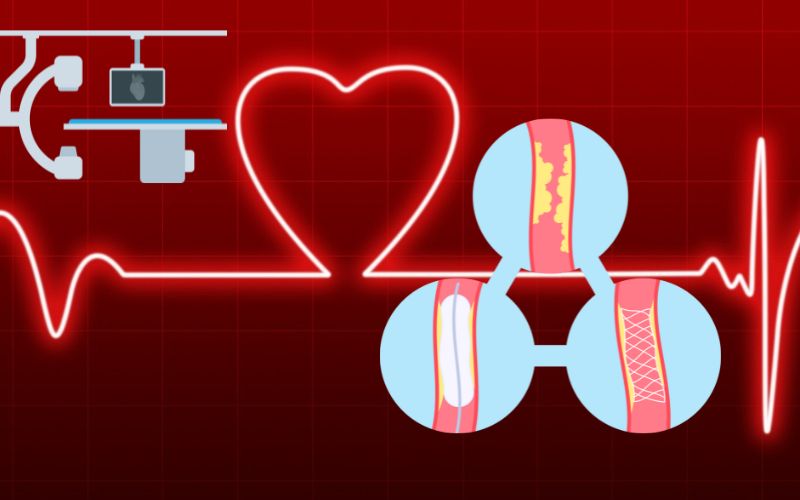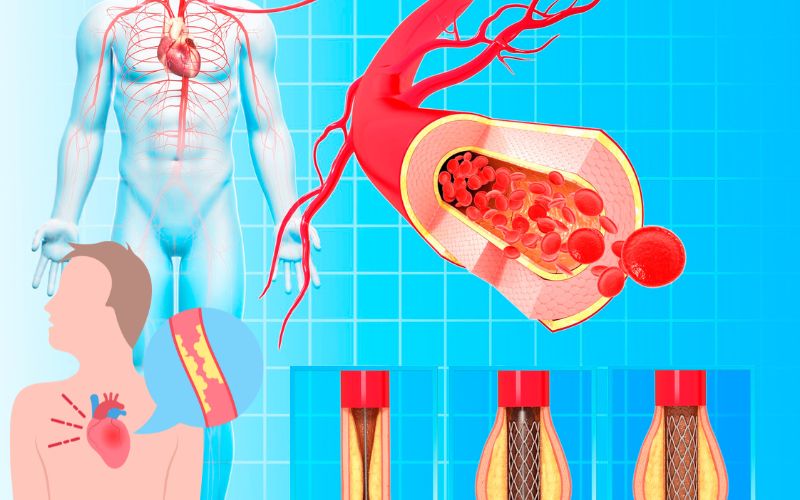Heart disease is a major global healthcare issue and patients need heart stent operations to survive. People who have undergone coronary stent placement to clear blocked arteries or who need heart placement of 3 stents because of multiple blockages must properly manage their post-operative life.
Delhi NCR is a leading medical destination which provides top cardiology hospitals in India and cardiac specialists in Delhi. But what happens after the surgery? How does life change? Patients need to understand what lies ahead after receiving heart stent surgery during the first months of recovery.
This article provides guidance on life after stent surgery, recovery including lifestyle and treatment along with possible post-operative complications. The article discusses all necessary details about post-stent heart attack recovery for individuals who have just undergone this treatment or those planning for carotid artery stenting.
Heart Stent Surgery
During a heart stent operation, doctors open arteries that are either blockages or narrow. Through this procedure, blood can freely travel to the heart. It is a minimally invasive procedure where a small mesh tube (stent) is placed into the artery.
Why Is Heart Stent Surgery Needed?
Patients may need a coronary stent if they have:
- Severe chest pain due to blocked arteries (angina)
- A recent heart attack requiring immediate intervention.
- Multiple blockages that may require 3 stents in the heart or more
- A high risk of stroke. It may require carotid artery stenting
Types of Stents
There are different types of stents used in stent surgery, including:
- Drug-Eluting Stents (DES) – Coated with medication to prevent re-narrowing.
- Bare-Metal Stents (BMS) – Without medicines, allowing faster healing but with a higher risk of blockage.
- Bioabsorbable Stents – Dissolve over time, reducing long-term complications.
These options can help patients and doctors choose the right heart stent price based on budget and medical needs.
The First Few Days After Heart Stent Surgery
Recovery starts the moment the procedure is completed. Most patients stay in the hospital for a day or two before being discharged.
Immediate Post-Surgery Care
- Doctors will monitor your vital signs, including blood pressure and heart rate.
- You may experience mild chest discomfort or bruising at the catheter insertion site.
- Blood thinners and other medications are prescribed to prevent clot formation.
Returning Home: What to Expect
Once discharged, patients must take extra care to avoid complications. Key aspects of early recovery include:
- Limited Physical Activity – Avoid lifting heavy objects or engaging in strenuous exercise for at least a week.
- Medication Adherence – Blood thinners are essential to prevent clotting around the stent.
- Dietary Adjustments – A heart-healthy diet is crucial for recovery and long-term health.
While most patients feel better within a few days, full recovery from a heart stent operation may take weeks.
Life After a Heart Stent: Long-Term Changes
After stent surgery, patients must make significant lifestyle adjustments to prevent future heart problems.
Dietary Changes: What to Eat and What to Avoid
A balanced diet can prevent artery blockage and improve overall heart health.
Heart-Healthy Foods:
- Fruits and Vegetables – Rich in antioxidants that support heart function.
- Whole Grains – Help lower cholesterol and improve circulation.
- Healthy Fats – Found in nuts, seeds, and olive oil, they help reduce inflammation.
- Lean Proteins – Such as fish, poultry, and plant-based proteins.
What to Avoid After a Stent
- Processed Foods – High in unhealthy fats, sodium, and additives.
- Sugary Drinks and Snacks – Can lead to weight gain and high blood sugar.
- Excessive Salt – Raises blood pressure and strains the heart.
- Red Meat and Fried Foods – Increase cholesterol and plaque buildup.
Maintaining a healthy diet can significantly improve heart stent before and after results.
Exercise and Physical Activity Post-Stent Surgery
Regular exercise is essential, but patients must ease into physical activity gradually.
When to Start Exercising
- First Week: Light walking for 5-10 minutes daily.
- After Two Weeks: Increase walking duration but avoid intense workouts.
- After One Month: Cardiac rehabilitation programs may be introduced.
Recommended Exercises
- Walking – Strengthens the heart and improves circulation.
- Cycling – Low-impact but great for cardiovascular health.
- Yoga and Stretching – Helps reduce stress and promotes flexibility.
Patients should avoid high-intensity workouts and consult their doctors before resuming activities.
How Does Stent Surgery Differ from Bypass Surgery?
Stent Surgery vs. Bypass Surgery
A heart stent operation is less invasive and has a quicker recovery time compared to bypass surgery. However, bypass surgery is recommended in cases of severe blockages where multiple arteries are affected.
Which One Is Right for You: A Bypass surgery or stent?
Doctors decide based on factors like blockage severity, age, and overall health condition.
Medicines and Follow-Up Care
Essential Medications Post-Stent Surgery
- Blood Thinners – Prevent clotting in the stent.
- Cholesterol-Lowering Drugs – Reduce plaque buildup in arteries.
- Beta-Blockers – Control blood pressure and heart rate.
- Aspirin – Helps keep blood flowing smoothly.
Regular Heart Doctor Visits
Patients need regular check-ups to monitor heart health. Common tests include:
- ECG and Stress Tests – To check heart function.
- Blood Tests – To monitor cholesterol and blood sugar levels.
Proper medication adherence reduces the risk of death during a stent procedure or future complications.
Heart Stent Cost in Delhi
Factors Affecting Heart Stent Price
The heart stent cost varies depending on several factors, including:
- Type of Stent Used – Drug-eluting stents are more expensive than bare-metal stents.
- Hospital Charges – Private hospitals may charge more for heart stent surgery compared to government hospitals.
- Doctor’s Fees – The experience and expertise of the cardiologist can affect pricing.
- Post-Surgery Medications – Blood thinners and other prescribed drugs add to the total cost.
Many insurance policies cover heart stent operation costs. Patients should check with their providers about coverage limits, co-pays, and whether cashless treatment is available.
Complications and Stent Removal Considerations
While heart stent surgery is generally safe, some patients may experience complications.
Possible Risks After Stent Surgery
- Restenosis – The artery can narrow again over time.
- Blood Clots – Can block the stent, leading to another heart attack.
- Bleeding or Infection – At the catheter insertion site.
Stents are mostly permanent, but in rare cases, stent removal is required due to:
Severe blockages or complications.
Stent migration or improper placement.
Allergic reactions to the stent material.
Doctors evaluate each case individually before recommending stent removal.

How to Prevent Another Blockage After a Heart Stent?
What Increases the Risk of Restenosis?
- Poor diet and high cholesterol levels.
- Smoking or exposure to secondhand smoke.
- Uncontrolled diabetes and high blood pressure.
Tips to Keep Arteries Clear
- Regularly monitor cholesterol levels.
- Maintain a healthy weight through diet and exercise.
- Take prescribed medications without missing doses.
Living a Heart-Healthy Life After Stent Surgery
Mental and Emotional Well-Being
Many patients experience anxiety or depression after heart stent surgery. Support groups, counseling, and stress management techniques like meditation can help.
Long-Term Outlook: Heart Stent Before and After
With proper lifestyle changes, medications, and regular monitoring, patients can enjoy a long, healthy life after stent surgery. Most individuals return to normal activities within a few weeks and significantly improve their heart health over time.
Are There Alternatives to Heart Stents?
When Can Medications Work Instead?
In cases of mild blockages, medications like blood thinners and cholesterol-lowering drugs may be sufficient without requiring coronary stent placement.
Other Procedures for Treating Blocked Arteries
- Angioplasty Without a Stent – Balloon inflation to open the artery without placing a stent.
- Bypass Surgery – Creating a new pathway for blood flow using a vein or artery from another part of the body.
Life after heart surgery in Delhi requires commitment to a heart-healthy lifestyle, regular medical check-ups, and a positive mindset. Whether recovering from carotid artery stenting or managing multiple types of stents, taking the right steps can prevent future heart problems.
Delhi offers some of the best medical facilities for cardiac care. If you or a loved one need expert guidance after stent surgery, consult Kalra Hospitals, where experienced cardiologists provide top-tier post-operative care and rehabilitation.
Take control of your heart health today—your future depends on it!








